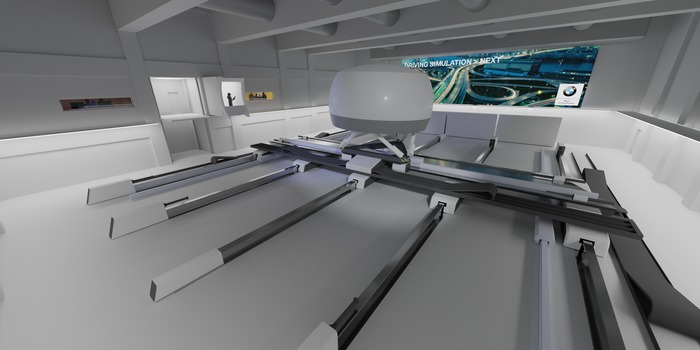BMW’s all-new US$116m Driving Simulation Centre is taking shape at the FIZ Research and Innovation Centre in Munich’s Milbertshofen district. In mid-August, the company began construction of one of the world’s most advanced facilities for the simulation of real-world driving situations.
Providing a number of possibilities for virtual testing of ADAS and display and control concepts, the new building features two high-fidelity and high-dynamic simulators from Bosch Rexroth, in which longitudinal, transverse and rotational movements of a vehicle can be represented simultaneously. According to BMW, this allows its engineers to realistically reproduce urban driving situations, enabling vehicle responses to be constantly enhanced.
The simulators’ high-fidelity motion platform features a hexapod and rotating yaw table on top of an X-Y table with an 18 x 15m (59 x 49ft) displacement, which helps to maintain the illusion of driving in a wide range of scenarios. Linear motors, together with a stiff structure, enable each machine to support a 6,000kg (13,230 lb) payload and deliver high accelerations of up to 1g. Furthermore, a wheeled track replaces conventional rails to support high speeds of up to 8m/s (26ft/s) in both longitudinal and lateral directions.
“Autonomous vehicles require significant testing before they can be allowed on the roads,” said Rik de Swart, sales manager, Motion Simulation Technology, Bosch Rexroth. “Our motion platforms provide the ideal solution for safely testing many different scenarios, even ones that would be impossible to set up in real life. These new systems for BMW raise the bar in several ways, such as the new gantry system needed to achieve the very large Y excursions.”
Construction of the new Driving Simulation Centre is part of BMW’s FIZ Future masterplan, which calls for the OEM’s central development facility to grow by some 50% through several stages up to 2050. The foundation stone for the first phase was laid in autumn 2017 and now the start of work on the new Driving Simulation Centre marks a further stage in the project.
It is being built in a central area between the Projekthaus and Aerodynamic Test Centre. Covering a total floor area of 11,400m² (122,700ft²), the facility will comprise 14 simulators and usability labs employing 157 people. BMW Group Research is planning to start work there in 2020.


